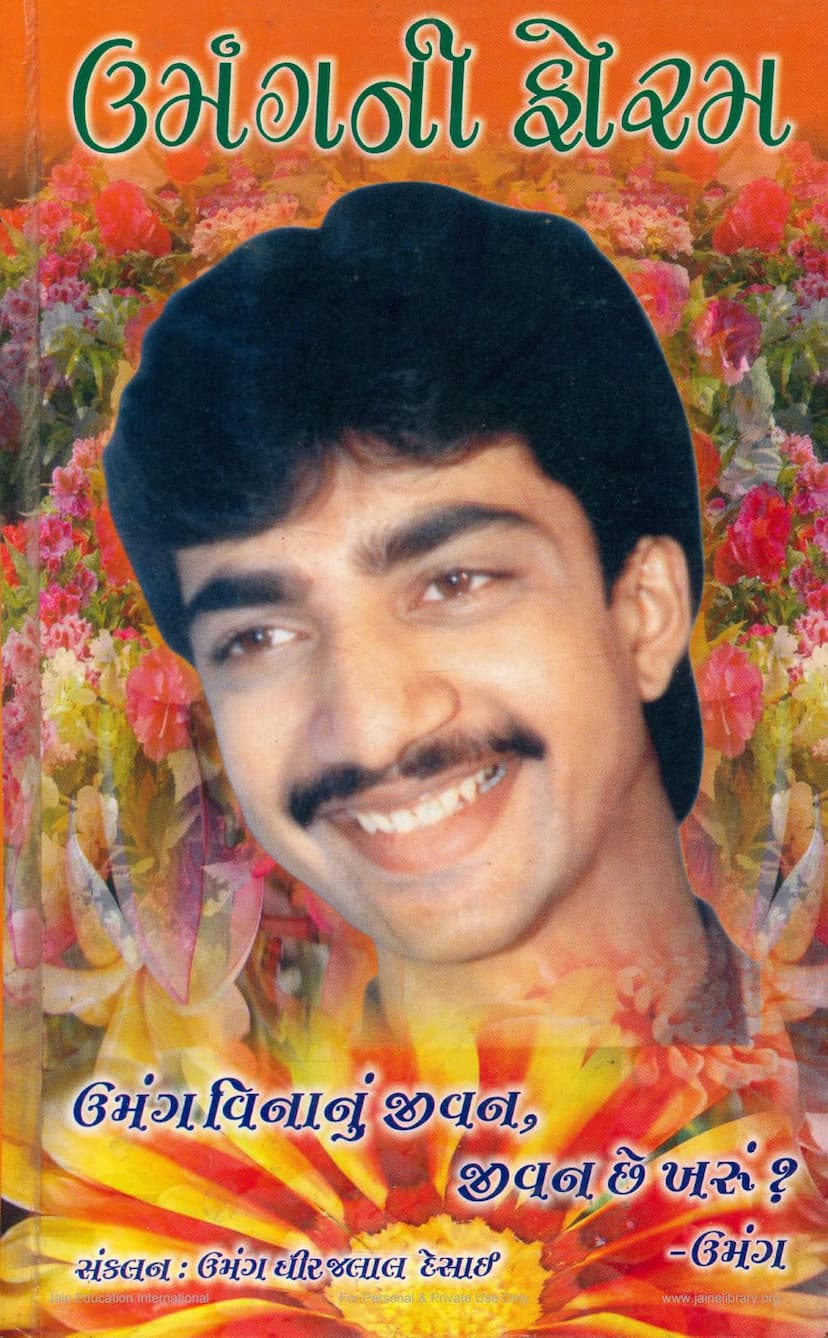Umangni Foram
Added to library: September 2, 2025

Summary
Here's a comprehensive summary of the Jain text "Umangni Foram" based on the provided pages:
Title: Umangni Foram (The Forum of Umang) Author/Compiler: Umang Dhirajlal Desai Publisher: Harakhchand Harjivandas Desai Parivar
Core Theme and Purpose: "Umangni Foram" is a compilation of thoughts, quotes, and reflections, primarily centered around the life and philosophy of Umang Desai. The book serves as a tribute to Umang Desai, highlighting his positive qualities, his approach to life, and his eventual peaceful passing. It also aims to share wisdom and guidance gleaned from various sources, intended to inspire readers towards a meaningful and virtuous life, aligned with Jain principles.
Key Aspects and Content:
-
Tribute to Umang Desai:
- The book is dedicated to the author's father, Harakhchand Harjivandas Desai (born July 30, 1914, passed March 1, 1992), who lived an exemplary life.
- Umang Desai is consistently portrayed as a person full of "Umang" (enthusiasm, spirit, joy). His life is described as being filled with love, kindness, positivity, and a deep connection with family and friends.
- Despite facing significant health challenges, including a severe intestinal illness and a major operation, Umang Desai maintained a positive outlook, a smile, and a deep faith.
- His final moments are described as peaceful, having performed his daily religious duties and expressed forgiveness before passing away with the name of the divine on his lips.
- He is remembered for his humility, his ability to spread happiness, his meticulousness in work, and his genuine relationships with everyone, regardless of social standing.
-
Compilation of Wisdom (The "Foram" - Forum):
- The bulk of the book is a collection of inspirational quotes, proverbs, and reflections from various saints, philosophers, spiritual leaders, and religious texts. These quotes cover a wide range of topics related to life, spirituality, ethics, and conduct.
- Emphasis on Samta (Equanimity): A recurring theme is the importance of equanimity (Samta) in facing life's joys and sorrows, wealth and poverty, honor and dishonor. Quotes emphasize accepting what comes with a balanced mind, without attachment or aversion.
- The Power of Karma: The text highlights the Jain understanding of karma, suggesting that current experiences are the result of past actions and that facing them with equanimity is a form of spiritual practice.
- Mind Control: Numerous quotes stress the importance of controlling the mind, as the mind's influence can lead to progress or destruction.
- Importance of Virtues: Kindness, forgiveness, contentment, truthfulness, self-control, detachment, perseverance, and honesty are consistently praised and encouraged.
- Living a Meaningful Life: The collection encourages readers to live a life of purpose, perform good deeds, be compassionate, and strive for spiritual growth. It emphasizes that true wealth lies in contentment and peace, not just material possessions.
- The Nature of Life and Death: The transient nature of life and the importance of preparing for the spiritual journey are subtly woven into the narrative.
- Self-Reliance and Inner Strength: Many quotes point towards finding strength and solutions within oneself rather than relying solely on external factors or divine intervention without personal effort.
- Ethical Conduct: The importance of integrity in dealings, speaking truthfully, and treating others with respect is repeatedly mentioned.
-
Jain Philosophical Underpinnings:
- The compilation is deeply rooted in Jain philosophy, with references to concepts like karma, samta (equanimity), the path of spiritual practice (sadhana), and the liberation of the soul (moksha).
- The quotes often reflect the teachings of Tirthankaras and Jain scholars, emphasizing inner purification and detachment from worldly possessions and attachments.
-
Structure and Presentation:
- The book features quotes on individual pages, often attributed to their sources.
- The compilation is presented as a way to keep Umang Desai's memory alive and to share the "living art" he embraced and the wisdom he gathered.
- The family's effort to publish this collection is seen as a way to fulfill Umang's legacy and share his insightful compilation with the world.
Overall Message: "Umangni Foram" is more than just a collection of quotes; it's a testament to a life lived with "Umang" – enthusiasm, positive spirit, and a deep commitment to ethical and spiritual principles. It serves as a guide for readers to cultivate inner peace, practice equanimity, understand the principles of karma, and strive for self-improvement and spiritual upliftment. The book aims to provide inspiration and practical wisdom for navigating life's complexities with grace and purpose, honoring the memory of Umang Desai, whose own life embodied many of these noble ideals.